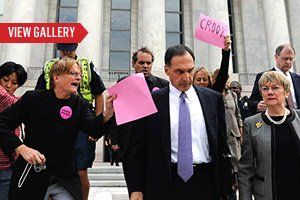
President Obama and leading Democrats are calling the "Restoring American Financial Stability Act of 2010" the greatest overhaul of Wall Street since the Great Depression. And that may well be true. But judging from the many loopholes in the legislation—with more to come as the banks maneuver stealthily to tweak the final product in conference—the new bill might be better termed "the Accountants' and Lawyers' Welfare Act of 2010." The bottom line is that despite the blizzard of amendments and provisions added—including some very smart changes at the 11th hour, like imposing greater control of ratings agencies—what's likely to emerge on the other side of this in the years to come is a Wall Street that's largely unchanged if marginally more regulated.
Indeed, if any structural changes to Wall Street follow from this law, it is likely to be that the biggest banks get even more powerful than they already are, despite the size limits being placed on them.
The accountants and lawyers—read lobbyists—have already made some serious inroads. Sen. Maria Cantwell of Washington State had wanted to add a simple provision shedding light on the vast "dark" market in swaps, which until now has been almost entirely unregulated. The language stated clearly that it shall be "unlawful" if a swap that the Securities and Exchange Commission wanted to be "cleared" out in the open was not cleared. But that language was somehow deemed too strong or troublesome for the industry. Now there is no threat of a finding of illegality and no penalty promised if swaps deals don't go through a clearinghouse. Another provision, also introduced somewhat mysteriously, says that clearinghouses can't be forced by authorities to accept swaps for clearing—again, allowing at least some swaps to be traded privately by default. All this led Cantwell to vote against the bill because, she said, "it fails to close the very same loopholes in derivatives trading that led to the biggest economic implosion since the Great Depression."
Other problems: the banks fought hard—and won a partial victory—in an effort to water down the definition of open and competitive derivatives trading. When the bill passed out of Sen. Blanche Lincoln's agriculture committee—which shared oversight of derivatives with the banking committee—it had language defining a so-called swap execution facility as a "trading facility," clearly meaning that swaps could only be traded in pits or on electronic platforms with multiple buyers and bidders. That sounds like an obscure point, but it's actually central to Wall Street's profits, and it explains how the multi-trillion-dollar derivatives market got away from regulators in the 2000s. For the banks, the more swaps and other derivatives they can trade off exchanges in "custom-made" deals with customers, the harder it is for those customers to figure out the trade's fair value and real risk—and the easier for the banks to increase their profit margin.

But Chris Dodd's banking committee dropped the term "trading facility." Even though the Senate bill is still stronger than the House version—requiring an openness to multiple bidders—the erased language seems to open the door to behind-the-scenes telephone trading by the banks. In other words, less openness, less competition. Cantwell and Sen. Tom Harkin of Iowa had earlier tried to introduce an amendment further defining a "swap execution facility" so that transparency was ensured, but it never got off the ground.
A new tough generation of regulators led by Gary Gensler, chairman of the Commodity Futures Trading Commission (CFTC), says they're not worried by these nuances because the bill gives them broad discretion to write rules requiring open trading and clearing of swaps and other derivatives. And that's what they intend to do. The problem is: Gensler's not going to be around forever, and the Bush-era regulators got into the habit of not using any of their discretion at all. After all, banks urged them over the years not to worry. The same cycle is likely to repeat itself when the next boom arrives. Rob Johnson, a former economist with the Senate banking committee who has been active in pushing for greater reform, says the new bill actually ought to be called the "Trust the Fed and Regulators Act of 2010." "It is a bill that has few structural changes and lots of responsibilities put on the shoulders of regulators who did not perform well in the last go-round," he says. "The [bankruptcy] resolution powers are helpful but nowhere near sufficient to create the conditions for real ability to close too-big-to-fail institutions."

Indeed, perhaps the oddest unintended result of the new legislation may be that it ends up making the too-big-to-fail banks even more significant in the financial system. Gensler is very happy with the Senate bill overall, but one provision he is worried about provides the new clearinghouses with access to the Federal Reserve discount window. "The fear is it would lower risk-management practices at the clearinghouses," says a CFTC official—in other words, create a whole new brand of moral hazard. And who is likely to come to control the clearinghouses? The big banks, which will be able to create a whole new futures market of their own, perhaps even displacing the Chicago Mercantile Exchange. The only thing that might prevent this is if tough ownership-limitation provisions are put in, as in the House version. (Rep. Stephen Lynch, D-Mass., had proposed language barring banks from owning more than 20 percent of any clearinghouse.)
But the Wall Street lobby—which called the Lynch amendment "anticompetitive"—will be working hard in the coming weeks to prevent that from happening too.
Michael Hirsh is also the author of At War with Ourselves: Why America Is Squandering Its Chance to Build a Better World.
Uncommon Knowledge
Newsweek is committed to challenging conventional wisdom and finding connections in the search for common ground.
Newsweek is committed to challenging conventional wisdom and finding connections in the search for common ground.





